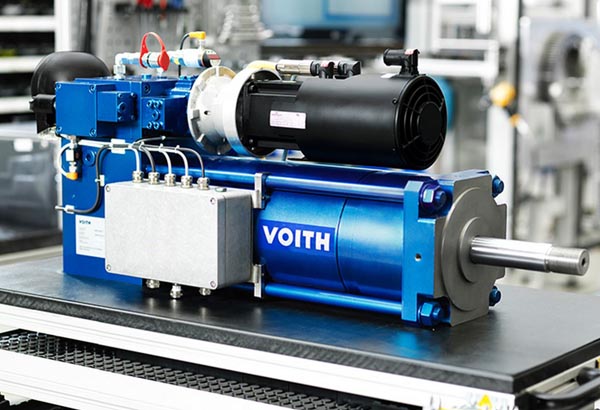Voith Introduces Self-Contained ‘SelCon’ Linear Actuator with Fail-Safe Function
![]() Print this Article | Send to Colleague
Print this Article | Send to Colleague
The Voith SelCon was primarily designed as a linear actuator with safety function for the valve controls of gas and steam turbines. It combines the advantages of hydraulic and electromechanical solutions. The hydraulics provides high force density and dynamics, the electromechanical side contributes simple, cost-effective system integration. Large effective forces up to 500 kN and ATEX certification allow it to be used on turbines under virtually all conceivable ambient conditions.

The hydraulic system of the SelCon is self-contained. An external hydraulic power pack with oil tank, control block, and pipework is completely unnecessary. This reduces procurement costs by up to 35% compared with a conventional solution. In addition, the system has a considerably higher operational reliability. External hydraulic disturbances such as pressure fluctuations, mismatched pipe diameters, or negative pressure in the tank line are out of the question.
The position is controlled by means of a servo pump according to the displacement principle. As a result, the actuator has a high degree of energy efficiency and the level of heat introduced into the integrated hydraulic system is low. The energy costs for operating the actuator are up to 50% lower than for classic actuators using conventional valves and a hydraulic power pack. The control through the servo pump provides the same or even better dynamics and control response as comparable electromechanical actuators. This achieves stable processes with high product quality.
The fail-safe function is implemented using an internal return spring. The trip time for the valve controls is typically less than 300 miocro-seconds. This reduces the danger of direct and consequential damage considerably.
The SelCon design is modular and usually compatible with existing hydraulic, electromechanical, and pneumatic actuators. Integration into new systems and the modernization of existing systems can be accomplished in a cost-effective manner with minor planning effort.
Various standardized communication interfaces and the use of real-time Ethernet protocols make the SelCon ready for Industry 4.0 (Internet of things) concepts. For example, intelligent process optimization, remote diagnostics, and condition monitoring come to mind.


